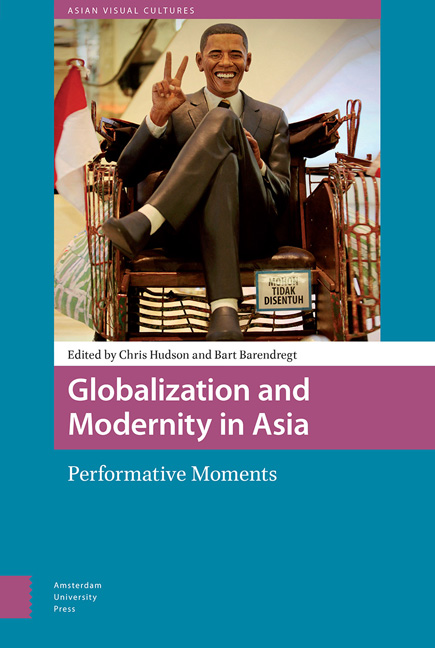Book contents
- Frontmatter
- Contents
- List of Figures
- Acknowledgments
- 1 Global Imaginaries and Performance in Asia
- 2 Globalizing the Imagination: Introductory Reflections
- 3 Weddings, Yoga, Hook-ups: Performed Identities and Technology in Bali
- 4 Super Premium Soft Double Vanilla Rich and the Ideal of Convenience in Japan
- 5 Unearthing the Past and Re-imagining the Present: Contemporary Art and Muslim Politics in a Post-9/11 World
- 6 Keeping Communists Alive in Singapore
- 7 Performative Pedagogies: Lifestyle Experts on Indian Television
- 8 Performing Cities: The Philippines Pavilion at the 2010 Shanghai International Exposition
- 9 Mobile Performance and the In-between: Yogyakarta Comes to Melbourne
- 10 An Islamist Flash Mob in the Streets of Shah Alam: Unstable Genres for Precarious Times
- 11 Pure Love?: Sanitized, Gendered and Multiple Modernities in Chinese Cinemas
- 12 Yogya on Stage
- Index
9 - Mobile Performance and the In-between: Yogyakarta Comes to Melbourne
Published online by Cambridge University Press: 11 December 2020
- Frontmatter
- Contents
- List of Figures
- Acknowledgments
- 1 Global Imaginaries and Performance in Asia
- 2 Globalizing the Imagination: Introductory Reflections
- 3 Weddings, Yoga, Hook-ups: Performed Identities and Technology in Bali
- 4 Super Premium Soft Double Vanilla Rich and the Ideal of Convenience in Japan
- 5 Unearthing the Past and Re-imagining the Present: Contemporary Art and Muslim Politics in a Post-9/11 World
- 6 Keeping Communists Alive in Singapore
- 7 Performative Pedagogies: Lifestyle Experts on Indian Television
- 8 Performing Cities: The Philippines Pavilion at the 2010 Shanghai International Exposition
- 9 Mobile Performance and the In-between: Yogyakarta Comes to Melbourne
- 10 An Islamist Flash Mob in the Streets of Shah Alam: Unstable Genres for Precarious Times
- 11 Pure Love?: Sanitized, Gendered and Multiple Modernities in Chinese Cinemas
- 12 Yogya on Stage
- Index
Summary
Abstract
Certain events that took place during the 2012 Melbourne Festival linked Jalan Malioboro (Malioboro Street), Yogyakarta, and Swanston Street, Melbourne – two streets some 4,500 kilometres apart. Swanston Street and other parts of the city of Melbourne became the locations where, to use Ash Amin and Nigel Thrift's gloss on the potential of cities to organize experience, ‘the far became near and distance was redefined.’ A performance called Grobak Padi that was staged as part of the Festival formed transnational urban connections through activities in the squares and the streets and created a moment in which distance was redefined and the world could be inhabited from afar. A grobak is an Indonesian food cart that typically sells cheap local dishes as it moves through urban and other spaces in Indonesia. Several grobaks were imported from Yogyakarta for the 2012 Melbourne Festival. After being dismantled in Yogyakarta and reassembled in Melbourne, they became travelling objects in more ways than one as they negotiated the streets of Melbourne and stopped in squares and on the riverbank to sell satay and other dishes. Festival-goers who clustered around the grobaks became not only spectators or consumers of the food, but also part of the performance. The official Grobak Padi flyer announced that the performance offered ‘a little piece of Java in the heart of the city’ that would take the form of ‘an intimate exchange between cultures and cities.’ Described also as ‘a deliciously cross-cultural performance piece,’ what made this intimate exchange and the cultural interaction across distance possible was the addition of media technology to the grobaks. Through mediated exchanges between citizens in Melbourne and Yogyakarta, the grobaks created the conditions for global connections that went beyond the need for physical proximity to develop social relations across distance. This chapter examines the ways in a performative moment conquered physical distance to create an imagined presence of the global other.
Keywords: Yogyakarta, Melbourne, mobile performance, food carts, travelling objects, technology
Grobak Padi and the Melbourne Festival
Events that took place during the 2012 Melbourne Festival connected Jalan Malioboro (Malioboro Street), Yogyakarta and Swanston Street, Melbourne – two streets some 4,500 kilometres apart.
- Type
- Chapter
- Information
- Globalization and Modernity in AsiaPerformative Moments, pp. 149 - 168Publisher: Amsterdam University PressPrint publication year: 2018



